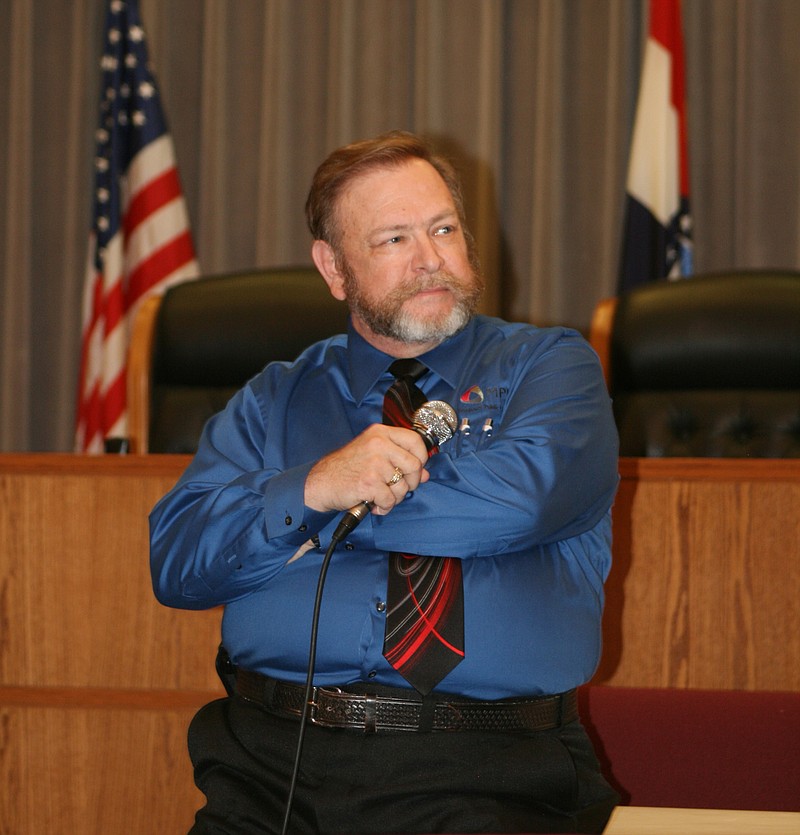Leaders of several area municipalities gathered in Fulton Tuesday night to hear a presentation from the Missouri Public Utility Alliance on the costs of operating utilities and the impact pending EPA/DNR regulations will have on those costs.
In addition to Fulton city administrators, council members and utility board members, the cities of Holts Summit, Mexico, Columbia, Moberly and New Florence also were represented.
Floyd Gilzow, director of member relations and public affairs for MPUA, started the meeting off by asking the municipal leaders what positive things are going on in their communities.
"I think we have a lot of positive things going on. Right now we have up and running our landfill generator, which the last I checked was generating over 115,000 kilowatts," Fulton Mayor LeRoy Benton said when it was his turn to speak. "Some of the other positives are we are also in the process of installing and getting going a smart grid - we're working very hard at that, and hopefully down the path that's going to be a real positive."
Holts Summit City Administrator Brian Crane mentioned his city passing a $7 million bond to build a new sewer plant and continued interest in the community from outside businesses.
"Things are great at the top of the hill in Holts Summit," Crane said.
After the introductions were out of the way, Gilzow got down to business, noting that, "the reason you, as community leaders, need to understand (the Clean Air Act, the Federal Water Pollution Control Act and impending EPA/DNR regulations) is because it's going to impact your costs."
He spent time explaining the Clean Air Act, which he noted was passed in 1963, and the Water Pollution Control Act, which was passed in 1972, focusing on the fact that the end result of both of those pieces of legislation require "continuous quality improvement based on scientific review."
"Over time, it's going to be better - that's the basis of both these laws, so that every year pollution levels go down, and down and down," Gilzow said. "Every time (the allowable pollution level) goes down, it creates a little more expense."
He emphasized several times the idea that the limits set by the acts "will always be changing" and the impact that change has on municipalities providing utilities - and not just in the form of higher production costs. As one of the slides in Gilzow's presentation stated, "The facilities you have today may not meet the new criteria in three or more years."
In looking at requirements for water, he gave the example that within the next five years, cities are going to be required to take nutrients - phosphorous and nitrogen - out of water.
"You'll have to do that either through flocculation - which means putting chemicals in the final pool - or by running it through massive filters," Gilzow said. "The problem is, what do you do with (the nutrients) after you take it out, and you're going to have to need room for the machinery to do it.
"Those are challenges cities face in trying to meet these new regulations. Your city administration is figuring out how to hit a moving target when they don't even know in what direction that target is moving."
The bulk of Gilzow's presentation focused on trends in federal and state environmental law.
First up were pending federal rules on power plants.
One of the rules he highlighted will require power plants that put out more than 25 million megawatts to decrease their emissions of mercury, acid gases and fine particulate matter by 2015. Gilzow said this new rule will affect at least 1,600 plants nationwide, costing them millions to retrofit their facilities and possibly affect the availability of power when some of those plants cannot afford to make the changes.
"This has been called the most expensive environmental rule ever passed," Gilzow said.
He said the impact of all of the changes - which also includes regulations regarding carbon dioxide regulation, water discharges from power plants and coal ash residual - will include higher rates to pay for compliance and severe limits on new power plants - no more coal-fired or simple-cycle natural gas power plants.
"Rates are going to go up. The EPA says no more than 3 percent on average ... I'm hearing 25-60 percent," Gilzow said. "Coal is cheap, standard natural gas extraction is cheap, but natural gas turbines and diesel generator plants are more expensive.
"We're going to go from spending $20-$30 to $250 a megawatt hour."

